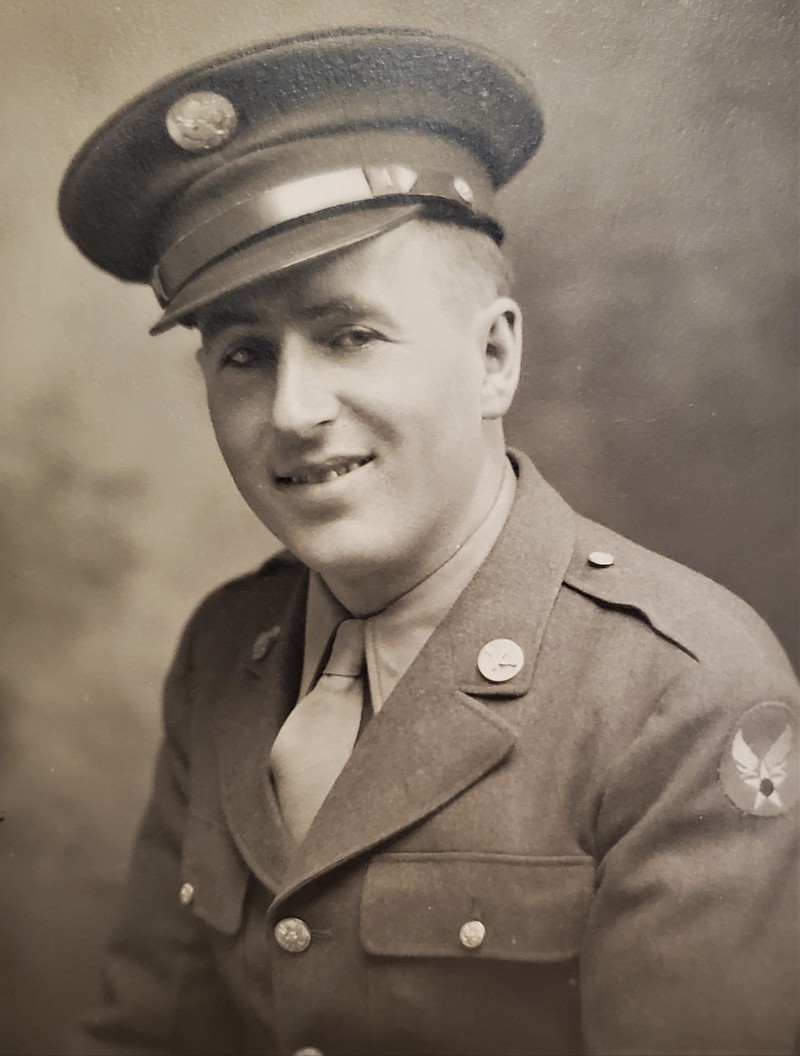Like many a hardy youth growing up on farms in the 1930s, Paul Hill was instilled with a work ethic he carried with him into later years.
He would go on to join scores of his peers inducted into the military during World War II, demonstrating a commitment to the nation that earned them the title as the "Greatest Generation."
Yet through all those experiences, he never was one to share boastful accounts of any accomplishments.
Raised near Latham, Hill and his five siblings attended Red Bush School - a one-room schoolhouse - through the eighth grade. When finishing his education, he helped on the family farm before finding work in defense plants in Kansas City and Baltimore.
"When he left for Maryland, he knew the draft was coming," the veteran's son, Rex Hill, said. "He was inducted in 1943 and assigned to the U.S. Army Air Forces and the 33rd Photo Reconnaissance Squadron.
"Early in his service, he was stationed at Morris Field, North Carolina," he said.
The Jan. 25, 1944, edition of the Daily Capital News reported Hill was with the squadron at Gainesville Army Air Field in Texas, when he accompanied it on its transfer to Will Rogers Field in Oklahoma City. It was during this timeframe that tragedy struck within his family circle.
"Our dad's younger brother, Leslie Clay Hill, was killed in a B-17 crash in Ardmore, Oklahoma, on Feb. 12, 1945," Rex Hill said. "Our father was stationed 90 miles away and was given leave to accompany his brother's wife back to Mid-Missouri for the burial in California City Cemetery."
Shortly after returning to his military duties in Oklahoma, Hill and the 33rd Photo Reconnaissance Squadron departed for Camp Shanks, New York - a point of embarkation for deployment to Europe. Squadron records note it sailed aboard the SS Nieuw Amsterdam, arriving at Gourock, Scotland, on April 26, 1944. Its initial duty station became Chalgrove Field, England.
"Our P-38s carried no guns and very little armor for weight reduction to gain more speed in combat missions. These missions were as low as 25 feet, in some cases, to photograph a certain objective for study by upper echelon and field unit infantry commanders," Elwood Davis, a veteran of the Hill's squadron, wrote in an issue of the magazine Air Classics.
"Our unit participated in the battles of Normandy, the Battle of the Bulge and was one of the first Allied air units to operate on German soil, ending up at the Elbe River on VE Day. Our ground crews worked in mud, snow and ice to get their planes in the air, and our photography support units worked around the clock, in many instances, to retrieve and develop film in record time for use by infantry and armored combat commanders," Davis added.
Rex Hill said his father was a member of one of these dedicated support crews that ensured the reconnaissance pilots were able to successfully perform any missions they were assigned.
"He was part of the crews that worked on the radios for the P-38s," the veteran's son said. "The P-38s they used were stripped-down fighter planes without any weapons. The aircraft had cameras installed and two powerful motors, and was able to outrun just about anything."
Hill's other son, John, noted that toward the latter part of the war, their father was detailed to help secure towns taken by infantry units on the push toward Berlin. This placed him in the situation of having the unenviable responsibility of assisting with the cleanup of one of the concentration camps in Germany.
"That's something our father never talked much about," John Hill said.
During the war, their father also had the opportunity to visit Paris while on leave. When using a public bathroom, a fellow soldier lit a cigarette, igniting fumes that had built up in the structure. The resulting explosion threw Hill and several of his fellow soldiers back into the street, but fortunately, no one was seriously injured.
When the war ended in Europe in the early days of May 1945, Hill remained in Germany and awaited orders to deploy in support of the battles being waged in the Pacific. Fortunately, Japan surrendered and the young soldier returned home to Missouri in late 1946.
He soon met Berniece Pummill, who was at the time working at Kroger in California. The couple married March 22, 1947, and went on to raise two sons.
"Our father bought a stock truck and hauled livestock to St. Louis and returned with loads of coal to sell for heating," Rex Hill said. "He also farmed, and sometime in the late 1950s, started driving a school bus and did that for 25 years."
A testament to their father's unwavering work ethic, he added, "Also, he went on to retire as the superintendent of the California Country Club."
The 82-year-old veteran died in 2002 and was laid to rest in California City Cemetery. His sons said their father was not one to casually share stories of his service during World War II, but he provided them occasional snippets that resulted in an enduring appreciation of his time spent in uniform.
"They had to live with what they went through in the war for the rest of their lives - not just our father, but all who served," Rex Hill said. "I didn't have the opportunity to serve myself, but my family and I are now in the position to appreciate what he did and to now share those stories with our children."
Jeremy P. Amick writes on behalf of the Silver Star Families of America.

